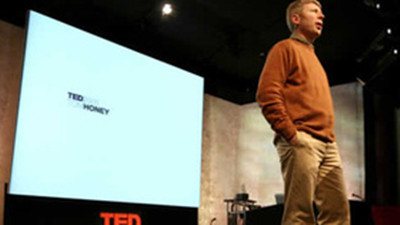And last week we sang with the children one of their favorite songs,
上周我們與孩子們一起唱了一首他們最喜愛的歌曲:
The Wise Man Built His House Upon the Rock.
聰明人建房巖石上。
Perhaps some of you know it. Some of the words go like this:
也許你們當中有些人知道這首歌。其中有些歌詞是這樣的:
The foolish man built his house upon the sand.And the floods came up And the house on the sand went crash.
笨人建房沙灘上,風吹水涌起波浪,房倒屋塌遭禍殃。

Then in the same week, at a funeral,we sang the familiar hymn We Plow the Fields and Scatter,a very English hymn.
就在同一個星期的一個葬禮上,我們唱起熟悉的贊美詩 我們犁田與播種,一首非常有英國風格的贊美詩。
In the second verse comes the line, The wind and waves obey Him.
在第二節有這樣一行,風和浪也順從他。
Do they? I don't feel we can sing that song again in church,after what's happened.
果真如此嗎?在海嘯發生后,我感覺我們不能再在教堂唱這首歌了。
So the first big question is about control.
因此,第一個大問題是關于掌控。
Does God have a plan for each of us? Is God in control?
上帝是否對我們每個人都有一個計劃?上帝是否在掌控中?
Does God order each moment? Does the wind and the waves obey Him?
上帝是否時時刻刻在安排這個世界?風和浪是否順從他?
From time to time,one hears Christians telling the story of how God organized things for them,so that everything worked out all right,some difficulty overcome, some illness cured, some trouble averted,a parking space found at a crucial time.
人們時常聽到基督徒講述上帝如何如何為他們安排各種各樣的事情,因此一切都最終順利解決了。比如:困難克服了,疾病治愈了,麻煩避免了,在關鍵時刻找到了一個停車位,諸如此類。
I can remember someone saying this to me,with her eyes shining with enthusiasm at this wonderful confirmation of her faith and the goodness of God.
我還記得有個人在對我講述這種故事時,她的眼中閃爍著熱情的光芒,認為這是她的信仰和上帝的美德的偉大見證。
But if God can or will do these things,intervene to change the flow of events then surely he could have stopped the tsunami.
但是,如果上帝能夠或者愿意做這之類的事情,干預改變事件的發生次序,那么毫無疑問他也應該能制止海嘯的發生。
Do we have a local God who can do little things like parking spaces,but not big things like 500 mile-per-hour waves?
難道我們有的只是一個小區域的上帝,可以管停車位這樣的小事情,卻不去管時速500英里的海浪這樣的大事情?
That's just not acceptable to intelligent Christians,and we must acknowledge it.
只要是有頭腦的基督徒都不能接受這個觀點,我們必須承認這一點:
Either God is responsible for the tsunami,or God is not in control.
要么上帝為海嘯負責,要么上帝失去了控制。
After the tragedy, survival stories began to emerge.
悲劇發生后,開始出現劫后余生的故事。
You probably heard some of them:
你們也許聽說過其中的一些。比如:
the man who surfed the wave,the teenage girl who recognized the danger because she had just been learning about tsunamis at school.
一名男子因為會沖浪而生還;一個十幾歲的女孩識別出了危險,因為她剛剛在學校學習了有關海嘯的知識;
Then there was the congregation who had left their usual church building on the shore to hold a service in the hills.
一個教堂的會眾沒有使用他們平時用的在海岸邊的教堂,而改在山上做禮拜,
The preacher delivered an extra long sermon,so that they were still out of harm's way when the wave struck.
牧師恰巧做了一個超長的講道,因此當巨浪襲來時他們還在山上而幸免于難。
Afterwards someone said that God must have been looking after them.
后來有人說,一定是上帝在保佑他們。
So the next question is about partiality.
因此,接下來的問題是關于偏袒。
Can we earn God's favor by worshipping Him or believing in Him?
我們可以通過崇拜或信仰來贏得上帝的青睞嗎?
Does God demand loyalty, like any medieval tyrant?
上帝是否要求忠誠,象中世紀的暴君一樣?
A God who looks after His own, so that Christians are OK,while everyone else perishes?
上帝是否只照顧信他的人,所以基督徒沒問題,而其他人要滅亡?
A cosmic us and them, and a God who is guilty of the worst kind of favoritism?
這個宇宙中有我們,他們,和一個犯有嚴重偏袒罪的上帝?
That would be appalling,and that would be the point at which I would hand in my membership.
這是非常可怕的,正是基于這一點,我辭去了我的教會職務。
Such a God would be morally inferior to the highest ideals of humanity.
這樣的上帝在道義上甚至還不如最理想的人類道德。
So who is God, if not the great puppet-master or the tribal protector?
那么上帝是誰,如果他不是那個偉大的傀儡操縱者或部落保護者的話?
Perhaps God allows or permits terrible things to happen,so that heroism and compassion can be shown.
也許上帝同意或允許可怕的事情發生,以便讓人們有機會表現英雄主義和同情心。
Perhaps God is testing us: testing our charity, or our faith.
也許上帝是在考驗我們:考驗我們的善心、我們的信仰。
Perhaps there is a great, cosmic plan that allows for horrible suffering so that everything will work out OK in the end.
也許有一個偉大的宇宙計劃,允許可怕的痛苦,但一切都將最終順利解決。
Perhaps, but these ideas are all just variations on God controlling everything.
也許吧,但這些說法都只是上帝控制一切的變種。



